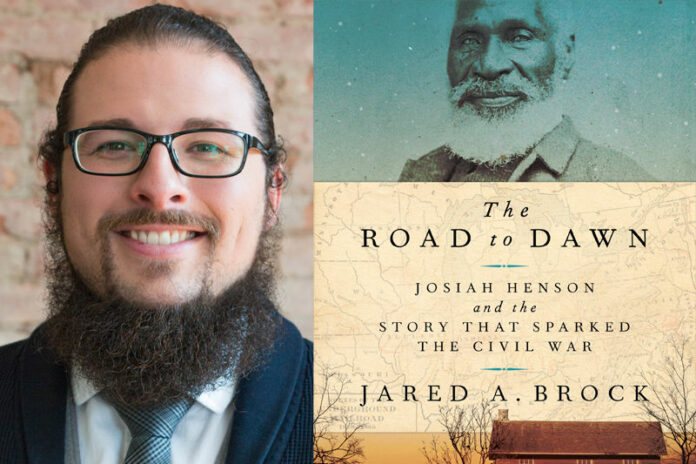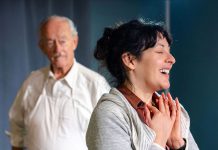Josiah Henson overcame incredible odds to escape from slavery, and improved the lives of hundreds of freedmen throughout his long life. He found international fame as the real “Uncle Tom” in the novel that fueled the abolitionist movement and ignited the Civil War. Join us on Josiah Henson’s birthday in celebrating his powerful story with author Jared Brock. Brock’s sweeping biography immortalizes Henson in an epic tale of courage and bravery in the face of unimaginable trials. Author Jared Brock has also made a short documentary called JOSIAH (Narrated by actor and activist Danny Glover), which will be screened at this event, followed by Q&A and a book signing with Jared.
When and where: Friday, June 15 at 7 p.m. to 8:30 p.m. at Copperfield’s Books, 138 North Main St., Sebastopol
An Interview with Jared Brock, author of The Road to Dawn
Q : Josiah Henson was a man who spent more than 40 years of his life in slavery but escaped with his family to become one of the great abolitionists of his time. Why do so few of us know about him?
A : Given enough time, history becomes a mystery. Without story stewards, narratives simply get lost. Now imagine a group of people under constant siege, where their oppressors systematically destroy every trace of their existence – think of Jews at the hands of Nazi Germany, or Natives in the face of American expansionism, or blacks in the antebellum, Jim Crow, and modern eras. Having spent several years on Josiah’s life, I can tell you that there are gaps in the narrative, deep questions I wish I had answers for that simply may never surface. Gratefully, there’s plenty to keep the flame going and spread his life lessons to hearts around the globe.
Q : How did you discover Josiah?
A : In February 2014, I was perusing a bookshop in Florida when I came across a copy of Uncle Tom’s Cabin by Harriet Beecher Stowe. My wife, Michelle, had been wanting the novel for a while, so I purchased a copy and stuffed it in her Christmas stocking. She read it, was moved by it, and I decided to do a little more research. I knew that Stowe’s novel had often been credited with influencing the debate at the heart of the Civil War. But I was surprised to discover that her novel was based on the life of a real man, named Josiah Henson.
Q : Why did you decide it was important for you to tell his story?
A : When I found out Josiah’s cabin was just a few short hours from my own home, I had to visit. We drove to Dresden, Ontario, on a blazing hot summer day, and Michelle read me Josiah’s humble little memoir on the return ride. We learned that the prime minister of Great Britain had thrown a surprise banquet in his honor, and that Lord Grey had offered him a job. The archbishop of Canterbury had wept after hearing his story. This man had been feted by queens and presidents, and he had won a medal at the first World’s Fair in London. He had rescued 118 slaves, including his own brother, and helped build a five-hundred-person freeman settlement, called Dawn, that was known as one of the final stops on the Underground Railroad. How had I never heard of Josiah Henson?
Basically, my curiosity led me to discover this amazing African-American hero. His life lessons—of compassion, leadership, and stewardship—were too great to ignore.
Q : In addition to being an author you’re also a documentary filmmaker, and to accompany The Road to Dawn you’re simultaneously releasing a film about Josiah’s life. How did you balance telling the story on the page versus on the screen? Why did you decide to add a film component?
A : We’re very excited about the documentary. It’s called JOSIAH, and it tells his story from birth to freedom in Canada. I believe in the power of film and was so honored when actor Danny Glover agreed to narrate the voice of Josiah Henson. We’re hoping the doc will serve as a gateway to dive deeper into Josiah’s story, and the greater historical context, in The Road to Dawn.
Q : You’ve additionally set up a foundation in Josiah’s name. Can you tell us about it?
A : We’re waiting on charity status, but we’re excited about what the Josiah Henson Foundation could become. Without preservation and conservation, we could lose him again. There are so many unknowns about Josiah’s life, let alone the greater story of slavery. Our goal is to make known the life and legacy of Josiah so that future generations can benefit from his lessons and leadership.
Q : You traveled 3,000 miles researching Josiah’s story. Can you tell us a bit about your journey—what you learned about yourself and what you learned about Josiah along the way?
A : A big lesson was never to travel to New Orleans in July without air conditioning! It was a very memorable trip. In addition to spending time in his actual home in Dresden, Ontario, I got to visit the Isaac Riley plantation in Maryland and the Francis Newman plantation where he was born. To think that such beautiful farms once were lands of torture, rape, and slavery is almost unfathomable. The trip really brought home the reminder of what each of us is capable of if we allow evil to manifest.
Q : Did anything unexpected happen during your research?
A : The Amos Riley plantation in Kentucky—the place from which Josiah and his family escaped across the Ohio River—is still owned by the slave owner’s descendants. No one had been allowed to tour the property in nearly forty years, but they kindly welcomed me to film for more than two hours. That was a gift.
I know it sounds naive and strange, but I attended the Henson family reunion in Michigan and was quite surprised to see… white people. The Henson family— like Josiah’s school nearly two hundred years ago—is wonderfully diverse. Science suggests we’re all, at most, fifty-fifth cousins, but we often forget the fact that we’re literally all one family. The brotherhood of man should be taught in classrooms above perhaps all else.
Q : What would people be most surprised to learn about Josiah?
A : An overseer used a six-foot fence post to break Josiah’s arm and shatter his shoulder blades when Josiah was in his early twenties. Josiah could never raise his hands above head from that moment on. He had to stoop forward to put his hat on.
Another interesting fact: there’s a very high probability that his huge list of descendants includes Matthew Henson (co-discoverer of the North Pole) and Taraji P. Henson (an amazing Hollywood actress.) I’d love to shoot a feature film about Josiah’s life in which she plays Josiah’s wife.
Q : A major part of Josiah’s story involves the novel Uncle Tom’s Cabin by Harriett Beecher Stowe—a novel that Lincoln somewhat jokingly stated sparked the Civil War. What did Josiah think when he learned he was the inspiration for the title character?
A : The novel made Josiah internationally famous. He traveled constantly and spoke hundreds of times on behalf of Dawn and the abolitionist movement. It was a role he was glad to play. Josiah wrote in his memoir: “From that time to the present, I have been called Uncle Tom. And I feel proud of the title. If my humble words, in any way inspired that gifted lady to write, I have not lived in vain. For I believe that her book was the beginning of the glorious end.”
Q : The Road to Dawn casts Uncle Tom’s Cabin in a new light and challenges us to question our perception of Uncle Tom. How can we change the way Uncle Tom is interpreted in modern times?
A : Today the term “Uncle Tom” has a very derogatory meaning due in no small part to the racist blackface plays of the late nineteenth and early twentieth centuries. But at the time the book was written, Uncle Tom was Superman. He was willing to stand up to injustice, even to the point of martyrdom, to realize the freedom of others. As modern readers learn the history of this horrible literary bastardization, I hope we reject its inherent racism and return to Stowe’s original intention.
Q : How does Josiah’s life resonate today, more than 130 years after his death? What lesson(s) do you hope readers/viewers take away after learning about him?
A : When Josiah reached the Buffalo side of the Niagara River, a Scottish captain paid to ferry the Henson family across to Canada. But he asked him a question first: are you going to be a good man? Josiah replied “I will use my freedom well.” Knowing his industriousness and entrepreneurial wiring, I’m certain that Josiah could have settled into a white picket fence Canadian dream lifestyle and lived out his days in comfort. Instead, he stewarded his freedom—and risked it again and again— to rescue others and fight for freedom in the political, economic, and educational arenas. It’s a call for all of us to use our freedom well.









